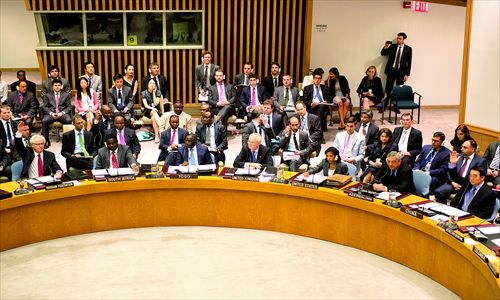Russia, China veto Syria sanctions

Russia and China on Thursday vetoed a Western-backed resolution that would have imposed sanctions on Syria at a UN Security Council meeting.
The proposed resolution threatened non-military sanctions against Syrian President Bashar al-Assad's government if he did not withdraw troops and heavy weapons from populated areas within 10 days, and is tied to Chapter 7 of the UN Charter, which could have allowed the UN to use force to end the conflict.
It would also have allowed an extension of the UN observer mission in the country for a period of 45 days.
The US condemned the "highly regrettable decision" of China and Russia to veto the resolution.
It is a "mistake to prop up that regime," President Barack Obama's spokesman Jay Carney told a White House briefing shortly after the veto, the third time in nine months.
Meanwhile, Russia accused Western nations of trying to justify military intervention in the country.
The resolution sought to "open the path to the pressure of sanctions and further to external military involvement in Syrian domestic affairs," Russia's UN ambassador Vitaly Churkin said after vetoing the resolution.
"Their calculations to use the UN Security Council to further their plans to put their pressure on sovereign states will not pass," he added.
Chinese foreign ministry spokesman Hong Lei on Thursday strongly condemned Wednesday's bombing in Damascus, which killed three key officials of Assad's inner circle at a government meeting.
According to Syria's Anatolia news agency, Mohammad Suri, a prominent opposition member, said on Thursday that the attack was supposed to target Assad but had failed.
Hong urged related parties to stop the violence and implement Kofi Annan's peace plan.
Zhang Xiaodong, a researcher with the Institute of West Asian & African Studies under the Chinese Academy of Social Sciences, told the Global Times that he expects the situation in Syria to further escalate out of control, given the rebels' determination to overthrow Assad and the regime's attempts to quell the unrest.
"That will push Annan's peace plan to a blind alley," said Zhang, adding that the possibility for the West to intervene militarily still exists despite the veto of the resolution.
Li Weijian, director of the Institute of Foreign Policy Studies under the Shanghai Institutes for International Studies, told the Global Times that the West would continue supporting the rebel forces in their efforts to overthrow Assad.
"They uphold the notion of violence for violence. As a result, the peace plan has never been implemented," said Li.
In Damascus, fighting continued overnight.
The Global Times correspondent in Damascus on Thursday found the clashes between government troops and rebels had intensified, with gunfire and shelling becoming more frequent and closer to the downtown areas.
The Chinese embassy in Damascus told the Global Times that the Syrian government has reinforced security personnel outside the embassy.
Syrian state TV said on Thursday new Defense Minister General Fahad Jassim al-Freij took his oath of office in front of Assad.
Thousands of Iraqi families crossed from Syria back into their home country on Thursday after the government appealed for them to return to avoid escalating violence.
Despite rumors that the rebels were attacking pro-government TV stations, the Global Times correspondent found that the Assad regime still had a tight grip on the media.
Li said that though the deadly bombing dealt a heavy blow to Assad's regime, it is far from what the rebel forces described as "a turning point."
"Though there were reports about defections by officers and soldiers, most of those switching sides were Sunnis. Around 80 percent of the army are Alawite, whose interests are tied up in Assad's regime," said Li.
Agencies contributed to this story